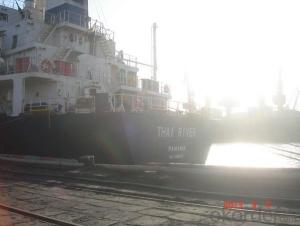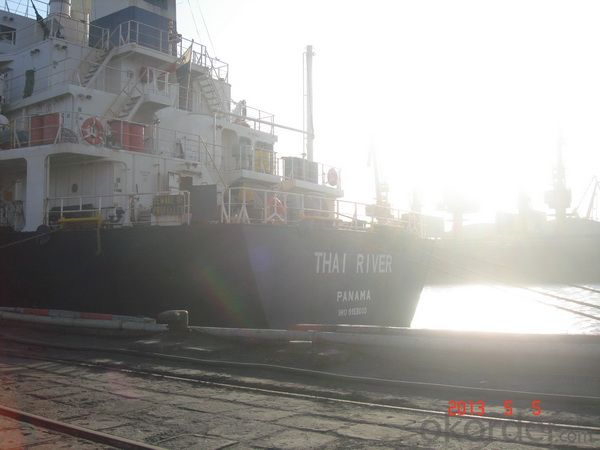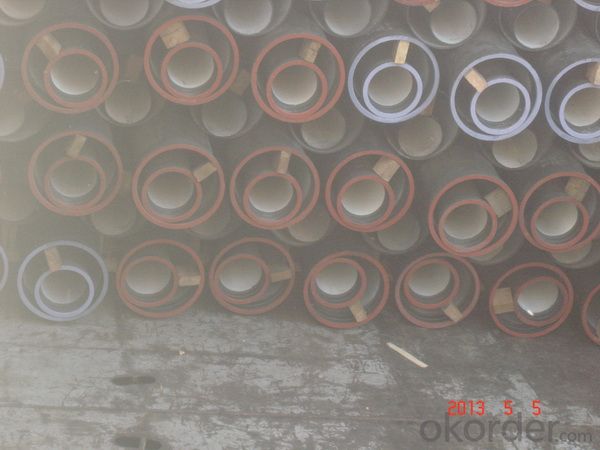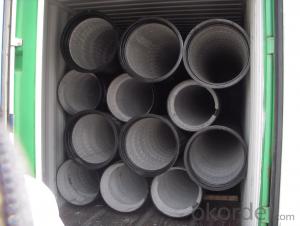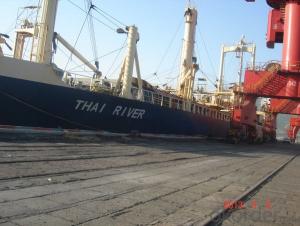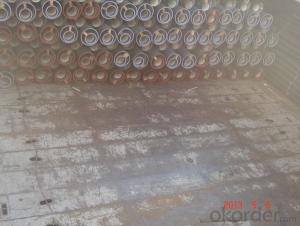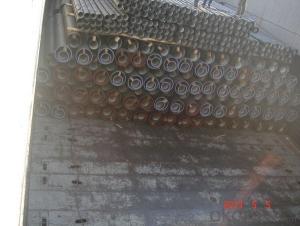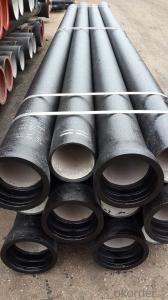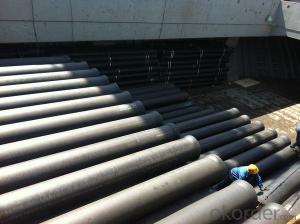DUCTILE IRON PIPES AND PIPE FITTINGS C CLASS DN500
- Loading Port:
- Tianjin
- Payment Terms:
- TT OR LC
- Min Order Qty:
- 22 pc
- Supply Capability:
- 3000 pc/month
OKorder Service Pledge
OKorder Financial Service
You Might Also Like
Material : Ductile Cast Iron
Size Range : DN 80mm to DN 2000mm
Unit Effective Length : 6m or 5.7m
Manufacture Standard: ISO 2531:1998/ EN 545:2006/EN 598:2007
Annual capacity : 200,000 tons
Coating Exterior: Zinc 130g/m2 according to ISO 8179-1 and bitumen coating 70 microns.
Cement Interior: Portland Cement/ High Alumina Cement/ Sulphate Resisting Cement Lining according to ISO 4179
Special requirements on external coating and internal lining can be applied
We also provide accessories such as SBR/EPDM rubber gaskets, lubricant paste, pipe caps, PE sleeves, etc.
Additional Parts:
Each pipe is strictly inspected according to related standard to ensure permanently high performance.
Easy Installation at site and service free for life
Long Service Lifespan
Quotation will arrive you within 24hours once we get your inquiry.
We guarantee offering you a competitive price.
A copy of original inspection reports of pipes will be offered after shipment.
Photos of loading process will be sent to the customer after shipment effect.
We will follow-up the delivery progress after shipment effect and update to the customer on weekly basis.
- Q: How does ductile iron pipe perform in areas with high soil settlement?
- Ductile iron pipe is known for its exceptional performance in areas with high soil settlement. Due to its inherent strength and durability, it can withstand the pressures exerted by settling soil without compromising its structural integrity. The flexibility of ductile iron pipe allows it to accommodate ground movements caused by soil settlement, thus minimizing the risk of pipe failure or damage. Its ability to adapt to these movements helps prevent cracks, leaks, and breaks that could occur in more rigid pipe materials. Moreover, ductile iron pipe's strong resistance to corrosion provides an added advantage in high soil settlement areas. It can withstand the corrosive effects of the soil and other environmental factors, ensuring the longevity and reliability of the pipe system. In areas with high soil settlement, ductile iron pipe is often the preferred choice due to its ability to handle ground movements without sacrificing performance. Its strength, flexibility, and resistance to corrosion make it an ideal solution for maintaining a robust and efficient water distribution system even in challenging soil conditions.
- Q: Can ductile iron pipe be used for both water and sewage applications?
- Yes, ductile iron pipe can be used for both water and sewage applications. It is a durable and versatile material that is resistant to corrosion and can handle the pressure and flow requirements of both water and sewage systems.
- Q: Can ductile iron pipes be used for water supply in remote areas?
- Ductile iron pipes are indeed suitable for water supply in remote areas. Renowned for their strength, durability, and versatility, these pipes are capable of serving various purposes, including water supply systems. Notably, their exceptional resistance to corrosion and ability to endure harsh environmental conditions renders them an ideal choice for remote areas with limited maintenance and repair services. Moreover, in comparison to alternative materials, ductile iron pipes boast a significantly longer lifespan, ensuring the sustained operation of water supply systems in remote areas. In summary, the reliability of ductile iron pipes for water supply in remote areas is attributable to their resilience, resistance to corrosion, and extended lifespan.
- Q: The difference between cast iron pipe and ductile iron pipe
- Cast iron pipes, also known as pig iron pipes, ordinary gray iron. Often used in socket connection, the sealing material is usually cement rigid interface.
- Q: What is the weight of ductile iron pipes compared to other materials?
- Ductile iron pipes are generally heavier compared to other materials commonly used in the construction industry. The weight of ductile iron pipes can vary depending on the specific size and dimensions, but they are typically heavier than materials such as PVC, HDPE, and steel pipes. This increased weight is primarily due to the dense nature of ductile iron, which provides durability, strength, and resistance to corrosion. However, the weight of ductile iron pipes also contributes to the challenges associated with transportation, installation, and handling, requiring appropriate equipment and techniques to ensure safe and efficient installation. Overall, while ductile iron pipes may be heavier than other materials, they offer numerous advantages in terms of longevity and performance in various applications.
- Q: What is the typical cost of maintenance for ductile iron pipes?
- The typical cost of maintenance for ductile iron pipes can vary depending on various factors such as the length of the pipes, the condition of the surrounding soil, and the specific maintenance activities required. However, on average, the cost of maintenance for ductile iron pipes can range from a few hundred to a few thousand dollars per mile per year.
- Q: How are ductile iron pipes joined to fittings and valves?
- Fittings and valves are commonly connected to ductile iron pipes using either flanged connections or mechanical joints. Flanged connections involve the use of circular discs called flanges, which have evenly spaced holes around the edge. These flanges are bolted together to create a tight seal between the pipe and the fitting or valve. To connect a ductile iron pipe to a fitting or valve using a flanged connection, the pipe end is first prepared by cleaning and removing any rough edges. Then, a gasket made of rubber or another suitable material is placed between the pipe end and the flange face. The flange is aligned with the pipe, and bolts are inserted through the holes in the flange, passing through corresponding holes in the fitting or valve. Once all the bolts are in place, they are tightened evenly, gradually applying pressure to compress the gasket and create a secure, leak-proof seal. To ensure proper alignment and sealing, the bolts are typically tightened in a specific pattern or sequence. Alternatively, mechanical joints can be used to join ductile iron pipes to fittings and valves. This involves inserting a rubber gasket or gland into a groove on the pipe end. The fitting or valve also has a corresponding groove, and when the two are brought together, the gasket is compressed to create a tight seal. Mechanical joints offer some flexibility, allowing for slight movement or expansion and contraction of the pipe. This is beneficial in applications where there may be thermal variations or ground movement, as it reduces the risk of pipe failure. Both flanged connections and mechanical joints are widely used in various industries and applications that require the connection of ductile iron pipes to fittings and valves. The choice of joining method depends on factors such as the specific application, pipe size, pressure requirements, and local codes and regulations.
- Q: Are ductile iron pipes resistant to biological growth?
- Yes, ductile iron pipes are generally resistant to biological growth. Ductile iron is a strong and durable material that is commonly used in water and sewage systems. Its smooth surface inhibits the growth of bacteria, fungi, and other microorganisms that can contribute to biological growth. Additionally, ductile iron pipes are often coated with protective linings or coatings, such as cement mortar or epoxy, which further enhance their resistance to biological growth. However, it is important to note that no material is completely immune to biological growth, and regular maintenance and cleaning of the pipes may still be required to ensure long-term resistance.
- Q: Can ductile iron pipes be used in dam or reservoir projects?
- Ductile iron pipes are highly suitable for dam or reservoir projects. Their strength, durability, and resistance to corrosion are well-known, making them a preferred choice for a range of applications, such as water distribution and transmission systems. In projects involving dams or reservoirs, where the pipes must endure high pressure and transport large volumes of water, ductile iron pipes are often the top choice. Their exceptional mechanical properties, including impressive tensile strength and impact resistance, guarantee their ability to handle the load and offer a dependable and long-lasting solution. Moreover, ductile iron pipes can easily adapt to various installation methods, including trenchless techniques, making them a versatile option for dam or reservoir projects.
- Q: How long do ductile iron pipes last?
- Ductile iron pipes have a lifespan of about 100 years or even more, making them a highly durable and long-lasting choice for water and sewage systems.
Send your message to us
DUCTILE IRON PIPES AND PIPE FITTINGS C CLASS DN500
- Loading Port:
- Tianjin
- Payment Terms:
- TT OR LC
- Min Order Qty:
- 22 pc
- Supply Capability:
- 3000 pc/month
OKorder Service Pledge
OKorder Financial Service
Similar products
Hot products
Hot Searches
Related keywords
